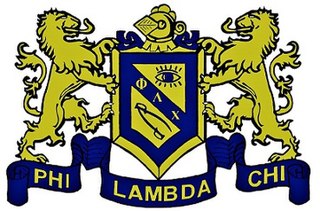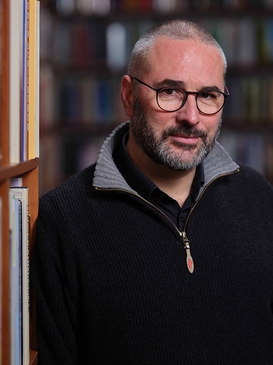The Portland Pattern Repository (PPR) is a repository for computer programming software design patterns. It was accompanied by a companion website, WikiWikiWeb, which was the world's first wiki. The repository has an emphasis on Extreme Programming, and it is hosted by Cunningham & Cunningham (C2) of Portland, Oregon. The PPR's motto is "People, Projects & Patterns".
James O. Coplien, also known as Cope, is a writer, lecturer, and researcher in the field of computer science. He held the 2003–4 Vloeberghs Leerstoel at Vrije Universiteit Brussel and has been a visiting professor at University of Manchester.
OOPSLA is an annual ACM research conference. OOPSLA mainly takes place in the United States, while the sister conference of OOPSLA, ECOOP, is typically held in Europe. It is operated by the Special Interest Group for Programming Languages (SIGPLAN) group of the Association for Computing Machinery (ACM).

Subtext is a moderately visual programming language and environment, for writing application software. It is an experimental, research attempt to develop a new programming model, called Example Centric Programming, by treating copied blocks as first class prototypes, for program structure. It uses live text, similar to what occurs in spreadsheets as users update cells, for frequent feedback. It is intended to eventually be developed enough to become a practical language for daily use. It is planned to be open software; the license is not yet determined.

OpenSym is a shorthand for International Symposium on Open Collaboration, formerly International Symposium on Wikis and Open Collaboration, also formerly WikiSym or the Wiki Symposium, a conference dedicated to wiki research and practice. In 2014, the name of the conference was changed from WikiSym to OpenSym to reflect a broadening of scope from wiki and Wikipedia research and practice to open collaboration research, including wikis and Wikipedia research, but also free/libre/open source, open data, etc. research. The conference series is held in-cooperation with ACM SIGWEB and ACM SIGSOFT and its proceedings are published in the ACM Digital Library.
Ralph E. Johnson is a Research Associate Professor in the Department of Computer Science at the University of Illinois at Urbana-Champaign. He is a co-author of the influential computer science textbook Design Patterns: Elements of Reusable Object-Oriented Software, for which he won the 2010 ACM SIGSOFT Outstanding Research Award. In 2006 he was awarded the Dahl–Nygaard Prize for his contributions to the state of the art embodied in that book as well.
Dollywood's Splash Country is a 35-acre (14 ha) water park located in Pigeon Forge, Tennessee, adjacent to the Dollywood theme park. The park's central theme rests around entertainer Dolly Parton's childhood swimming in the rivers of the Great Smoky Mountains. Dollywood's Splash Country operates from May through September.

The University of Health Sciences and Pharmacy in St. Louis is a private university focused on the health sciences that is located in St. Louis, Missouri. It was founded in 1864 as the St. Louis College of Pharmacy. The university includes St. Louis College of Pharmacy, the third-oldest and tenth-largest college of pharmacy in the United States, the College of Arts and Sciences, the College of Global Population Health, the College of Graduate Studies. The university is accredited by the Higher Learning Commission.
Brent Hailpern is a computer scientist retired from IBM Research. His research work focused on programming languages, software engineering, and concurrency.

Programming language theory (PLT) is a branch of computer science that deals with the design, implementation, analysis, characterization, and classification of formal languages known as programming languages. Programming language theory is closely related to other fields including mathematics, software engineering, and linguistics. There are a number of academic conferences and journals in the area.

Phi Lambda Chi (ΦΛΧ), commonly known as Phi Lamb, is a social collegiate fraternity founded at the Arkansas State Teachers College in 1925. It was formerly a member of the North American Interfraternity Conference (NIC).
YARV is a bytecode interpreter that was developed for the Ruby programming language by Koichi Sasada. The goal of the project was to greatly reduce the execution time of Ruby programs.
Mary Beth Rosson is the director of graduate programs and professor at the Penn State College of Information Sciences and Technology. Rosson also co-directs the collaboration and innovation lab. Most of her research concentrates on End User Programming, Computer Supported Cooperative Work (CSCW), and Human-Computer Interaction (HCI). Prior to teaching at Penn State, Rosson taught at the Virginia Tech Computer Science department for 10 years and worked as a research staff manager at IBM's Thomas J. Watson Research Center for 11 years. Rosson also served as the Dean for the Penn State College of Information Sciences and Technology from 2014 to 2016. Rosson earned her Ph.D. in experimental psychology in 1982 from the University of Texas at Austin and her Bachelors in Psychology from Trinity University(Texas) in 1977.
The history of the programming language Scheme begins with the development of earlier members of the Lisp family of languages during the second half of the twentieth century. During the design and development period of Scheme, language designers Guy L. Steele and Gerald Jay Sussman released an influential series of Massachusetts Institute of Technology (MIT) AI Memos known as the Lambda Papers (1975–1980). This resulted in the growth of popularity in the language and the era of standardization from 1990 onward. Much of the history of Scheme has been documented by the developers themselves.
HipHop for PHP (HPHPc) is a discontinued PHP transpiler created by Facebook. By using HPHPc as a source-to-source compiler, PHP code is translated into C++, compiled into a binary and run as an executable, as opposed to the PHP's usual execution path of PHP code being transformed into opcodes and interpreted. HPHPc consists mainly of C++, C and PHP source codes, and it is free and open-source software distributed under the PHP License.
Software archaeology or source code archeology is the study of poorly documented or undocumented legacy software implementations, as part of software maintenance. Software archaeology, named by analogy with archaeology, includes the reverse engineering of software modules, and the application of a variety of tools and processes for extracting and understanding program structure and recovering design information. Software archaeology may reveal dysfunctional team processes which have produced poorly designed or even unused software modules, and in some cases deliberately obfuscatory code may be found. The term has been in use for decades.
SPLASH is a programming language-related conference held since 2011, sponsored by the SIGPLAN special interest group of the Association for Computing Machinery (ACM). Its name is an acronym for Systems, Programming, Languages, and Applications: Software for Humanity. SPLASH is an umbrella conference for two longstanding conferences, OOPSLA and Onward! which are now tracks of SPLASH.

Kathryn S. McKinley is an American computer scientist noted for her research on compilers, runtime systems, and computer architecture. She is also known for her leadership in broadening participation in computing. McKinley was co-chair of CRA-W from 2011 to 2014.

Eelco Visser was an Antoni van Leeuwenhoek Professor of Computer Science at Delft University of Technology.

Yannis Smaragdakis is a Greek-American software engineer, computer programmer, and researcher. He is a professor in the Department of Informatics and Telecommunications at the University of Athens. He is the author of more than 130 research articles on a variety of topics, including program analysis, declarative languages, program generators, language design, and concurrency. He is best known for work in program generation and program analysis and the Doop framework.







